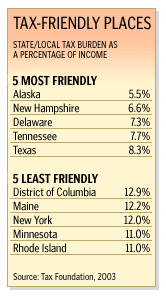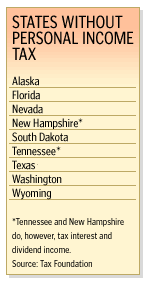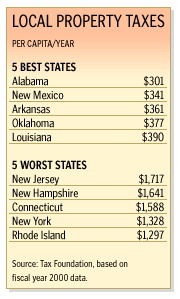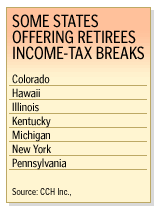NEW YORK (CNN/Money) -
When you think about taxes, your first thought may be Uncle Sam.
But there are two other coffers you're expected to fill annually -- those of your state and local governments. And your contributions are expected to be far more generous in some places than others. That's why where you live can make a big difference to your bottom line.
| The Money Lists
|

|
|
|
|
States, cities and towns can collect taxes on income, property, purchases of retail goods, fuel and other items, but the rates can vary widely.
In some cases, that rate is zero percent. Nine states, for instance, don't charge personal income tax. And those that do can use a flat rate or a graduated rate.
Sales taxes and property taxes can run the gamut as well. Some cities such as Anchorage, Alaska, don't levy a sales tax, while others, such as New York City, do.
Which states are the most tax-friendly?
In a report released Wednesday, the Tax Foundation ranks states according to the overall state and local tax burden borne by residents.

Using data from the Bureau of Economic Analysis and the National Conference of State Legislatures, the Foundation measured not only income, property, sales and other personal taxes as a percentage of per capita income, but also how much of businesses' taxes are passed along to state residents by way of higher prices, lower wages or lower profits.
The state with the lightest overall state and local tax burden is Alaska, which takes in a mere 5.5 percent of residents' per capita income. That's because there's no personal income tax nor a statewide sales tax, and residents' tax burden is reduced significantly by the tax revenue paid to the state by oil-drilling companies that do business there.
The Money List: See the tax burden in all 50 states
The heaviest state and local tax burden is borne by residents of the District of Columbia (12.9 percent) and Maine (12.2 percent).

Washington, D.C. levies high sales, income and property tax on its residents as well as tax-like fees on its businesses, said Scott Moody, senior economist for the Tax Foundation. That's in part because a high percentage of land and buildings in the District are federal property and are thus exempt from property tax -- a traditional staple for local government revenue.
In Maine, the per capita income of $28,960 is below the national average, so the state and local taxes levied account for a higher percentage of that income than they might in a state with a higher average income, Moody said.
Usually a big part of one's tax burden comes from property tax (most commonly on homes, but in some states also on other items, such as cars.)
New Jersey levies the highest state and local property taxes overall (charging $1,717 per capita) while Alabama has the lowest ($301 per capita).
So, why not move?
The Tax Foundation's lists don't tell the whole story.

First, they represent the burden for the statistically average taxpayer. And unless you actually have exactly 2.2 children and make the per capita income in a state (for example, in New York, it's $37,819), you're not it. In fact, few are.
When it comes to deciding whether a state and locality is tax-friendly for you, "the specifics of your income profile are more important to a location decision than the overall burden," said Bill Ahern, spokesman for the Tax Foundation.
Say you're a retiree. You may think moving to state without income tax is a boon. Which it might be if you're planning to live primarily on the distributions from your 401(k) or IRA, which are taxed as ordinary income. But if you're planning to live primarily on dividend and interest income from your taxable accounts, two of the nine states that don't tax income (Tennessee and New Hampshire) may not be your best bets, since they do tax investment income.

If you have a pension coming to you, you might also check whether your state taxes that. Illinois, for example, doesn't tax pensions or Social Security, said John Logan, senior tax analyst for tax information publisher CCH Inc.
Lastly, you can't ignore property taxes. New Hampshire, while it ranks as one of the most tax-friendly states overall, ranks No. 2 in terms of property taxes nationally, extracting an average of $1,641 per capita, according to the Tax Foundation. And Illinois ranks No. 10 at $1,168 per capita.
A little fresh air, anyone?
If you're really concerned about the state and local tax bite on your wallet, you might consider going rural, or at least steering clear of the big cities.
| RELATED ARTICLES
|

|
|
|
|
"As a general rule moving out of urban areas will lower your local tax burden," Moody said. That's because property taxes are usually tied to education. Since big cities have more school-age kids, education costs are high and therefore property taxes tend to be high.
What's more, he said, cities are more likely to charge income tax than smaller towns on the outskirts.
(Of course, the "country" isn't for everyone. If you're a city devotee, you might want to compare the estimated tax burden for a family of four making $75,000 in the largest cities in the country.)

|

